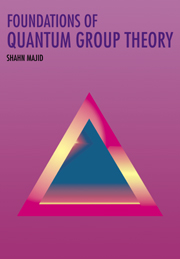Book contents
- Frontmatter
- Contents
- Introduction
- 1 Definition of Hopf algebras
- 2 Quasitriangular Hopf algebras
- 3 Quantum enveloping algebras
- 4 Matrix quantum groups
- 5 Quantum random walks and combinatorics
- 6 Bicrossproduct Hopf algebras
- 7 Quantum double and double cross products
- 8 Lie bialgebras and Poisson brackets
- 9 Representation theory
- 10 Braided groups and q-deformation
- References
- Symbols
- Index
- 2-Index
2 - Quasitriangular Hopf algebras
Published online by Cambridge University Press: 14 January 2010
- Frontmatter
- Contents
- Introduction
- 1 Definition of Hopf algebras
- 2 Quasitriangular Hopf algebras
- 3 Quantum enveloping algebras
- 4 Matrix quantum groups
- 5 Quantum random walks and combinatorics
- 6 Bicrossproduct Hopf algebras
- 7 Quantum double and double cross products
- 8 Lie bialgebras and Poisson brackets
- 9 Representation theory
- 10 Braided groups and q-deformation
- References
- Symbols
- Index
- 2-Index
Summary
The theme of this chapter is that when one has an axiom or condition for an algebraic structure, one can consider relaxing it so that it holds only up to some ‘cocycle’ element, which is then required to obey some consistency conditions which we have to specify. The most important application of this principle will be to the condition of cocommutativity studied in Chapter 1.5. Thus, we now study a class of Hopf algebras that are cocommutative only up to conjugation by an element R, called the ‘quasitriangular structure’, and obeying some conditions. This simple idea has far-reaching implications which will recur throughout the book. From an algebraic point of view, such Hopf algebras are truly different from the Hopf algebras associated to groups or Lie algebras already encountered in Chapter 1, and yet are so close to being cocommutative that all the familiar results for groups and Lie algebras tend to have analogues here also. Hopf algebras that are almost cocommutative in this way are called quasitriangular Hopf algebras. Because their properties are so close to those of groups or Lie algebras, they are also commonly called quantum groups. We will often use this term more loosely to apply to Hopf algebras in general, but this is the strict usage. We will give examples that are indeed deformations of familiar groups and Lie algebras later, in Chapters 3 and 4, but it should not be thought that they are the only examples.
- Type
- Chapter
- Information
- Foundations of Quantum Group Theory , pp. 38 - 71Publisher: Cambridge University PressPrint publication year: 1995

